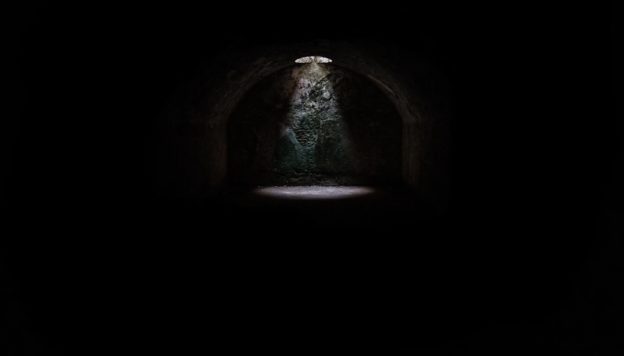It’s Day 19 of our nationwide lockdown. I’m grateful Jesus was not locked down! Job, in her suffering, has just explored the hope of legal justice from God (chapter 9) – but without hope, turns back to lament.
Previously: 1:1-5 | 1:6-12 | 1:13-22 | 2:1-6 | 2:7-13 | 3:1-10 | 3:11-26 | 4:1-21 | 5:1-7 | 5:8-27 | 6:1-30 | 7:1-21 | 8:1-7 | 8:8-22 | 9:1-35 |
Translation:
1 “I loathe my life
Let me abandon to myself my complaint,
Let me speak in bitterness of my soul.
2 saying to God: ‘Do not condemn me,
Let me know for what you are contending with me.’
3 Is it good for you that you oppress,
To despise the labour of your hands,
while you are radiant over schemes of wicked people?
4 Do you have eyes of flesh?
Or do you see as a man sees?
5 Are your days as a days of a humankind?
Or your years like the days of a man?
6 Since you search for my iniquity,
And for my sin you seek?
7 Upon your knowledge that I am not wicked,
And there is no one who delivers out of your hand?
- Job’s agony makes him blurt out to his friends: “I loathe my life” (v1). Amidst God’s continued silence yet ongoing contending (v2), he turns from his thoughts of litigation back to lament.
- Job fires off three sharp questions from vv3-5. How does it benefit God to oppress Him? Is God subject to human vision? Is God subject to human time? He’s wrestling with being in relationship with God yet not understanding what He’s trying to achieve.
- Verse 7 is important – Job thinks that God knows too that he’s innocent, yet he struggles to work out why he is present in his suffering, yet seemingly absent in his care.
8 Your hand shaped me and made me,
together all around, yet you destroy me.
9 Remember that like clay you have made me, and to dust I will return.
10 Did you not, like milk, pour me out?
And like cheese curdle me?
11 Skin and flesh you clothed me,
And with bones and sinews you have woven me.
12 Life and lovingkindness you gave to me (lit: you made with me),
And your supervision guarded (lit: watched) my breath.
- These verses echo Genesis – Job is personally fashioned and shaped by God, yet he can’t work out why his Maker would want to destroy him (verse 8). This is the same word that God uses in the prologue to describe how he’s “destroyed [Job] for no reason” (2:3)
- If God is committed to care for his creation, why won’t he now keep doing that? Job appeals to His character and lovingkindness (v12; chesed)
- The command “Remember” (v9) is key – Job asks God to remember him. In the midst of his lamenting (see also chapter 7 and 14), Job does not let go of his relationship with God.
13 Yet these you have hidden in your heart,
I know that this is with you.
14 If I sin then you watch over me,
And from my iniquity you would not acquit me.
15 If I am wicked, woe to me! And (if) I am innocent, I would not lift my head,
Full of shame, and see my affliction.
16 And if it was lifted up, like a lion you would hunt me,
Then you would return, show power at me.
17 You renew (impf.) your witnesses in front of me
and increase your anger with me,
Fresh troops (lit. changes and a host) are against (lit. with) me.
- These verses expand on the charge of verse 8: “and now you destroy me”. It’s dark and sombre.
- In verse 12, the word “watch” (shamar) describes how God cares for Him. Two verses later, the same word describes how God is overbearingly watching him to miss the mark and sin.
- Job is caught between what we knows about God (caring for His created ones) and what he feels right now (oppressed and corrected) – it’s as if he’s being hunted by poachers (v16), or attacked by another wave of soldiers (v17).
18 So why from the womb did you bring me out?
I could have died, and no eye see me.
19 Just as though I had not been,
Carried from the womb to the grave.
20 Are not few my days? Then refrain;
And leave me alone (lit: set from me) and cause me a little cheer.
21 Before I depart, and not return,
to the land of darkness and deep shadow,
22 the land of gloom, as thick darkness,
deep shadow without order,
and lights as thick darkness.
- Here are some final words of despair from Job. Much like chapter 3, he laments his birth. The main difference now is that here, he is brave enough to ask directly: “Why did you bring me out?” (v18, whereas previously he only lamented, “Why have I been born?”).
- There’s a cluster of six different words for darkness in verse 21-22. Job feels darkness, thick darkness, shadow and gloom.
- Yet he doesn’t give up – he laments sorrowfully, but still appeals to God rather than abandon faith in Him. He’s in relationship despite his unimaginable grief.
- In the same way, Jesus crying out at the cross “My God, my God, why have you forsaken me?” still recognises he is in relationship despite unimaginable grief. Thank God for that.
